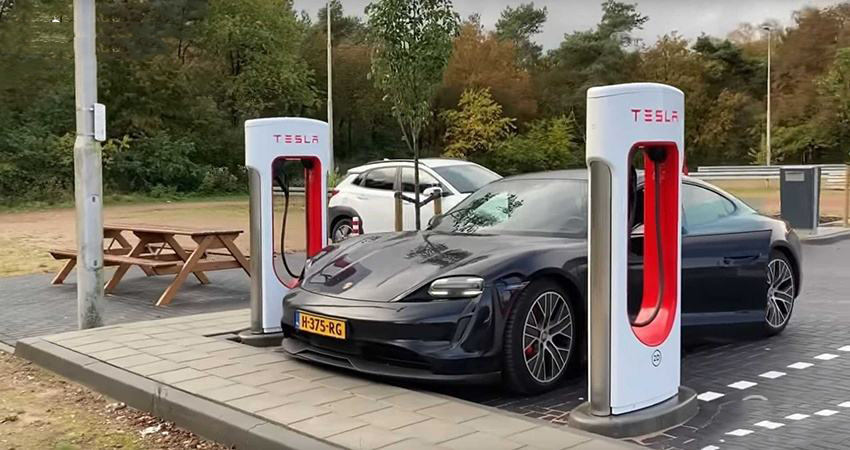
In the upsurge of the new energy automobile industry today, every technological innovation and market game affects the hearts of countless consumers. Recently, the IT House recently reported that the electric car giant Tesla formally sued a well-regarded third-party charger accessories manufacturer EVject, accusing its products of serious safety risks, and claiming that this behavior has damaged Tesla's brand image. This seemingly simple legal dispute is actually an undercurrent, hidden behind the complex interweaving of technology, market and user needs. This article will take an in-depth look at this case and try to uncover the mystery behind it.
Tesla, as the global leader in the field of electric vehicles, its brand influence and market share are obvious to all. Tesla has not only won the favor of consumers with its excellent performance and forward-looking design, but also its huge charging network as one of the core competitiveness. However, it is this huge charging network that has also become the starting point of Tesla's lawsuit. Tesla pointed out that EVject's products are at risk of overheating, which could threaten the safety of users and even cause fires, which is undoubtedly a direct challenge to its carefully constructed safety image.
However, in-depth analysis is not difficult to find that Tesla's move may not only be out of pure concern for user safety, but may hide deeper strategic considerations behind it. As the electric vehicle market matures, the rise of the third-party accessories market poses a potential threat to Tesla's original parts sales. By suing against competitors like EVject, Tesla may be aiming to maintain its market position in the field of charging accessories and solidify its brand barrier.
In contrast to Tesla's aggressive stance, EVject insists that its products are both convenient and safe. EVject's charger is designed to solve the pain point of Tesla owners in specific situations - charging at night or in remote locations, the owner needs to unplug the charging plug to start the vehicle, which increases the safety risk to some extent. EVject's product allows the owner to operate in the car, without getting out of the car to disconnect the charging connection, this innovative design has undoubtedly won a large number of users, especially women and young drivers.
It's worth noting that EVject's "convenience" doesn't come at the expense of security. Its official website clearly claims that the product's disconnection function can effectively protect Tesla's charging port and super charging plug from damage, which to a certain extent alleviates the quality concerns that users may have about third-party accessories. Tesla's lawsuit, however, casts this selling point as a safety hazard, raising the question of who is deliberately blurring the line between safety and convenience.
The dispute between Tesla and EVject is essentially a different interpretation of the safety standards for electric vehicle charging accessories. Tesla, as an industry leader, naturally has its strict safety standards and testing processes, but this may also lead to its being too conservative and ignoring the actual needs of some users. EVject, on the other hand, is closer to the market and designed with user needs in mind, and the convenience of its products is a direct response to this need.
Technology disputes are not irreconcilable, however. The key lies in how to better meet the diversified needs of users under the premise of ensuring security. The lawsuit between Tesla and EVject actually provides an opportunity for the entire industry to reflect. On the one hand, electric vehicle manufacturers need to continuously optimize product design and improve user experience. On the other hand, third-party accessories manufacturers should also strictly abide by industry norms to ensure product quality and safety. At the same time, relevant departments and institutions should also strengthen the supervision of the electric vehicle charging accessories market, formulate more scientific and reasonable safety standards, and promote the healthy development of the entire industry.
In this lawsuit, we should maintain a rational and objective attitude, not only to see the responsibility and responsibility of Tesla as an industry leader, but also to understand the innovation and efforts of third-party accessories manufacturers such as EVject. After all, the future of the electric vehicle industry belongs to all players who are committed to technological innovation and meeting the needs of users. Let us hope that through the settlement of this lawsuit, we can promote the further maturity and standardization of the electric vehicle charging accessories market, and provide consumers with a more safe, convenient and efficient charging experience.

Since 2025, the conflict between the United States and Europe over the governance of the digital economy has continued to escalate.
Since 2025, the conflict between the United States and Euro…
When German Chancellor Mertz officially announced that he w…
On December 3rd local time, the copper price on the London …
The European Commission announced a new economic security s…
The European Commission announced a new economic security s…
For nearly a year, US President Donald Trump has launched a…